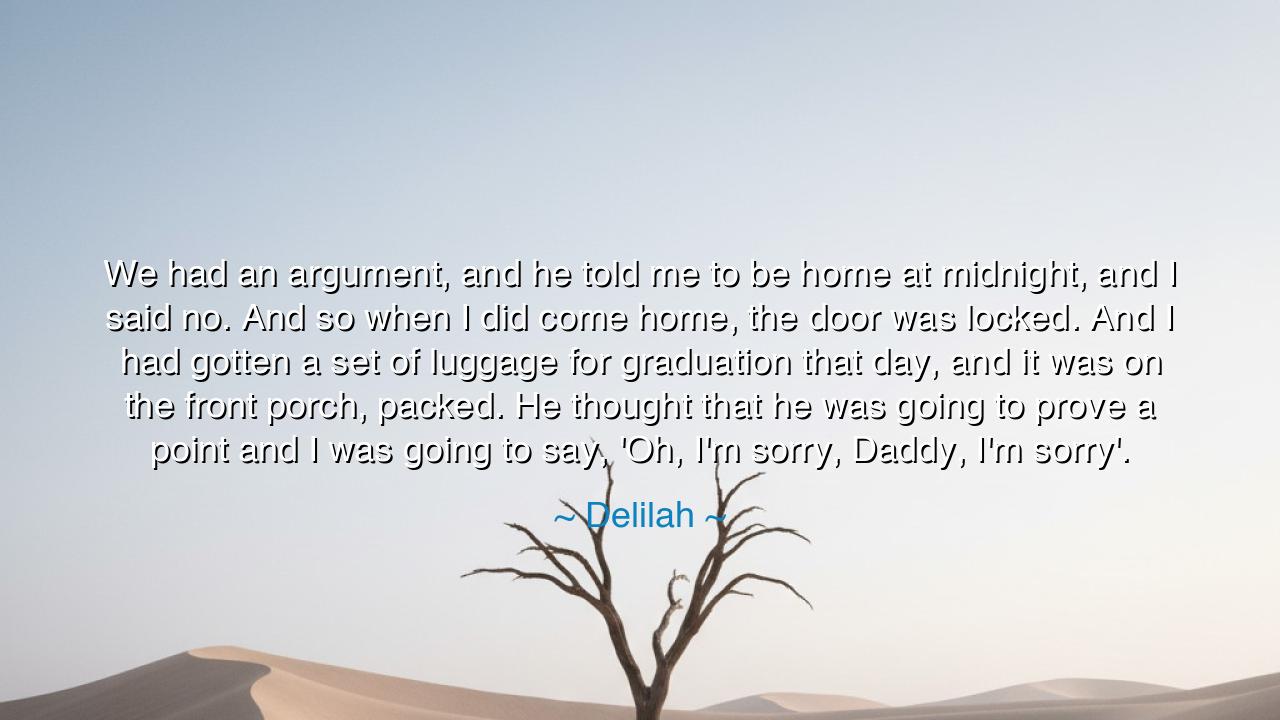
We had an argument, and he told me to be home at midnight, and I
We had an argument, and he told me to be home at midnight, and I said no. And so when I did come home, the door was locked. And I had gotten a set of luggage for graduation that day, and it was on the front porch, packed. He thought that he was going to prove a point and I was going to say, 'Oh, I'm sorry, Daddy, I'm sorry'.






Hear, O listener, the tender and defiant words of Delilah, whose story is both a wound and a revelation: “We had an argument, and he told me to be home at midnight, and I said no. And so when I did come home, the door was locked. And I had gotten a set of luggage for graduation that day, and it was on the front porch, packed. He thought that he was going to prove a point and I was going to say, ‘Oh, I’m sorry, Daddy, I’m sorry.’” In these words lies not a mere tale of rebellion, but the eternal moment when the child becomes the adult — when obedience yields to identity, and the safe walls of home become the threshold of destiny.
The meaning of this quote runs deep within the current of human growth. Delilah, a voice known to millions for her warmth and compassion, here speaks of a night that divided her life in two — the night she stepped from dependence into freedom. Her father, perhaps stern and proud, sought to teach her submission through consequence, believing that the threat of exile would humble her spirit. But instead, she met that moment with resolve. The luggage, meant as a graduation gift, became a symbol of transformation — the very instrument by which she left the world of childhood behind. Thus, what began as a punishment became a passage.
The origin of her story reflects the timeless tension between authority and autonomy — between the rule of the parent and the awakening of the self. Every generation must wrestle with this sacred struggle. The elders, out of love or fear, seek to protect and to guide, but in doing so, they sometimes forget that control cannot foster growth. The young, in their yearning to define their own path, must often risk the comfort of belonging to discover the power of being. Delilah’s story, set upon the simple stage of a suburban home and a locked door, becomes the myth of every soul who must one day walk away from shelter to find strength.
Consider the story of Sophocles’ Antigone, who stood before the king — her own uncle — and refused to obey his command. Her defiance was not born of rebellion for its own sake, but of conviction: she believed that divine justice stood higher than royal decree. Like Delilah, she chose to face consequence rather than surrender her will. Both women, in different ages and forms, embody the same truth — that there comes a moment when obedience to one’s inner voice must outweigh obedience to another’s rule, even if that rule is born of love.
Yet, we must not mistake this act of defiance for hatred. There is love, too, in the act of standing firm. Delilah’s father sought to test her, to bend her spirit through rejection. But she did not shatter; she did not beg. She walked forward, carrying not only her luggage but the invisible inheritance of every child who learns to live without approval. In that act, she honored both herself and, in time, even her father — for the lesson he tried to teach became one she learned in her own way. The power to stand alone is the foundation upon which compassion and wisdom are later built.
The lesson here is this: the road to adulthood is often paved with misunderstanding. Those who raise us may wound us not from cruelty, but from fear — fear that we will fall, that we will forget them, that the world will hurt us more than they can bear to see. But the child who never leaves home in spirit, who never risks rejection to find truth, remains forever a child. Delilah’s story is not one of bitterness but of liberation — the hard birth of independence. Every generation must pass through this fire, and in so doing, come to understand both sides of love: the love that holds on, and the love that lets go.
So, O listener, when your moment comes — when the door of comfort closes and the night wind greets you — do not despair. Gather your luggage, your courage, your faith. Step into the unknown. You may walk with trembling hands, but walk you must. For every soul who dares to leave the familiar behind walks the ancient path of transformation. And one day, when you stand on the other side of that journey, you will look back upon that locked door not as the end of your belonging, but as the beginning of your becoming.
For sometimes, the greatest gifts are those we do not understand until long after they are given — and the luggage left upon the porch is not a sign of rejection, but a call to adventure.






AAdministratorAdministrator
Welcome, honored guests. Please leave a comment, we will respond soon